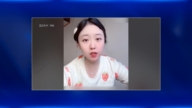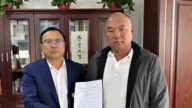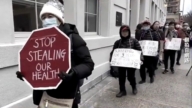【新唐人2013年05月02日讯】新的《精神卫生法》开始施行。条法中解释,精神障碍的诊断、治疗、住院、出院有严格的法定程序。精神障碍者住院治疗实行所谓“自愿原则”;精神障碍的诊断则由精神科执业医生作出。但法律界人士表示,“被精神病”现象是中共当局的一种故意行为,是否因新法上路而彻底杜绝,还持观望和怀疑态度。
《精神卫生法》从1985年启动立法工作算起,到2012年终于获得通过,经过了27个年头。根据新的《精神卫生法》,精神障碍的鉴定为医学鉴定,而不是司法鉴定,并且明确了“非自愿医疗”的概念、标准和程序等,不少媒体认为,新的精神法是“被精神病”的终结。
以往精神病院强制收治精神病人没有设置门槛,轻微病人都可能被强迫住院。报导说,《精神卫生法》适用的对像是严重精神障碍者,住院治疗实行“自愿原则”。住院病人,需经过两道程序:门诊医生确诊;住院前再由经治医生复诊,最终给出确诊结论的是经治医生。
对于中共公布施行的这个《精神卫生法》,大陆民众普遍表示质疑。而“东南大学”法学教授张赞宁表示,《精神卫生法》出台表面上说是一件好事情,但是,对“被精神病”现象能否彻底杜绝,他持观望和怀疑态度。
东南大学法学教授张赞宁:“因为被精神病现象已经是很长期的,这是当局的一种故意行为。有一些人他并不是精神病,它只是由于上访,由于他自己提出的一些意见,把他关进精神病院。现在我尤其担心的是,现在公安部门所办的那些精神病院,仍然没有取缔,或者撤销。所以这就为‘被精神病’仍然留下了一个隐患。”
张赞宁指出,公安部门不是卫生行政主管部门,没有资格或权力办精神病院。
张赞宁:“精神病院的管理权,掌握仍然掌握在公安部门的手里,而不是掌握在卫生行政手部门的手里,所以这一点我始终是有很大的顾虑,还要拭目以待。”
中国自由作家荆楚表示,对中国大陆的良心人士用精神病名义迫害,这是共产党一贯的传统。
中国自由作家荆楚:“因为中国这个政治体制下是官权大于一切,是个特权官本维持社会,在这种情形下,不能够保证医生能够做出公正的判断。”
而上海访民陆女士认为,新的《精神卫生法》不实际,恐怕光说不做,难以实施。
上海访民陆女士:“这个医生上面让你怎样就怎样,杀你就像蚂蚁一样,如果你进去以后,上面有哪个(官)叫你把他做掉就做掉,就是这样的。”
陆女士表示,有许多访民没有精神病也被当作精神病,强行关到精神病院,期间不许家属去看,也不允许放出来。
浙江省安吉县梅溪镇的上访维权人士沈志华,耕地被非法剥夺20年,多方诉求没有结果,在北京依法信访时,多次遭到镇政府工作人员暴力截访,沈志华还被强行送往精神病院检查。
浙江上访维权人士沈志华:“送我精神病院,不是一次而是强行两次。现在我是有苦难辩。我有一个7岁的儿子每天是我带的,我还有一个癌症晚期的妈妈,也需要我照顾,我真的是很悲惨的。”
沈志华在遭受种种迫害之后,如今生活拮据,身体非常衰弱。
荆楚:“在这种情况下你说自愿还是不自愿?说不清。现在是稳定压倒一切,维稳压倒一切,对于那些当局认为不太听话的人,它就想方设法把他关进精神病院。”
据报导,英国规定,如果医生要收治精神障碍的病人超过28天,他必须把提案和治疗方案提交给“精神卫生法庭”。另有一个由精神病专家组成的“精神卫生委员会”,这个独立的第三方,有权力对“精神卫生法庭”的裁决提出异议。同时来保证社会公众的利益。
采访编辑/唐睿 后制/黎安安
China passed first mental health law, will forced psychiatric treatment end?
China implemented a new Mental Health Act regulation.
The regulation said hospital treatment of mental illness
should follow strict law procedures.
Mentally ill patients’hospital stay should
be decided by themselves.
The diagnosis should be done by specialist doctors.
However, lawyers said that a “forced psychiatric treatment"
phenomenon has been deliberately carried out by the Chinese Communist Party (CCP).
After the new regulation is implemented,
will this phenomena disappear? Lawyers are doubtful.
The new Regulation was proposed in 1985,
and was approved in 2012. The approval took 27 years.
According the new regulation, mental illness should
be diagnosed by doctors rather than the court.
The new regulation clearly indicated a “non-voluntary
treatment"concept, standard and process rules.
Some media reported that the new regulation should
be the end of forced psychiatric treatment.
In the past, there no supervision sector had been set
for how mental hospitals take in patients.
Thus, people with minor mental problems
could be forcibly sent to mental hospitals.
Sources said that the new regulation is for dealing
with people having severe mental illness.
It’s based on a “voluntary" principle.
If patients need to stay in a mental hospital,
they should follow two steps.
Outpatient doctors give the diagnosis first; then before
the patient stays in the hospital, specialist doctors re-diagnose and give a final decision.
People in Mainland China generally questioned
the newly promulgated Mental Health Act.
Southeast University Law Professor Zhang Zanning
said the introduction of the act is a good thing in itself,
but he is skeptical whether the phenomenon of “being
labeled mentally ill"will be completely eliminated.
Southeast University law professor Zhang Zanning:
“Chinese authorities have long been intentionally labeling
people with psychiatric illness. Some people are not mentally ill.
However, they are detained in psychiatric hospitals because
they keep petitioning or remain as political dissidents.
I am particularly worried about those hospitals run
by the public security department, which are not banned.
So there is still a hidden danger of being labeled mentally ill."
Zhang Zanning pointed out that public security departments
are not health administrative departments, and thus not eligible to administer psychiatric diagnoses.
Zhang Zanning: “The power of managing mental hospitals
lies in the public security department, rather than the department of health administration.
I always have a lot of concerns over this problem.
We’ll have to see how it goes."
Chinese freelance writer Jing Chu said that
it has been the CCP’s long-standing tradition
to persecute people of conscience in Mainland China under the banner of mental illness.
Chinese freelance writer Jing Chu: “Under China’s political
system, officials’rights outweigh everything else.
The privileged official group controls the society.
In this case, it cannot be guaranteed that doctors
will make fair judgments."
Ms. Lu, a petitioner from Shanghai, believes that the new
Mental Health Act can hardly go beyond empty words.
Shanghai petitioner Ms. Lu: “The psychiatric doctors
follow whatever orders from above.
Killing a so-called patient is just like smashing an ant.
If you are thrown into the psychiatric hospital, you can
be easily killed if an official issues such an order. That is just the case."
Ms. Lu said that many petitioners are labeled mentally ill
and detained in psychiatric hospitals.
They are denied visits by family members, nor released.
Shen Zhihua is a human rights petitioner from
Meixi Town in Zhejiang Province.
His farmland was illegally deprived of 20 years ago.
He petitioned to various departments, only in vain.
When he went to petition in Beijing, he was repeatedly
blocked by officials from his hometown government.
He was also forced to receive mental health examinations.
Shen Zhihua, Zhejiang human rights petitioner:
“They sent me to mental hospitals twice.
Now I am suffering so much, yet unable to tell it to anyone.
I have a 7-year-old son with me everyday.
I also have a mother with late-stage cancer.
I am really living pathetically."
After various persecutions, Shen Zhihua now
lives in poverty, and is in very poor health.
Jing Chu:"In this case, can you say those “patients"
voluntarily attended the psychiatric hospitals?
In today’s China, social stability comes before
everything else.
The authorities will try to send dissidents
to hospitals by any means."
Reports say British doctors must submit a treatment proposal
to the Mental Health Court if they are to keep patients for over 28 days.
Besides, they have a Mental Health Commission,
composed of psychiatric experts.
This independent third party has the power to challenge
the Mental Health Court, and to protect public interests.






























